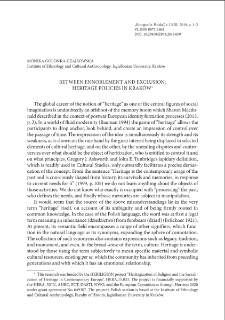- Search in all Repository
- Literature and maps
- Archeology
- Mills database
- Natural sciences
Advanced search
Advanced search
Advanced search
Advanced search
Advanced search

Object
Title: Between ennoblement and exclusion: heritage policies in Kraków
Subtitle:
Etnografia Polska 63 z. 1-2 (2019)
Contributor:
Publisher:
Instytut Archeologii i Etnologii Polskiej Akademii Nauk
Place of publishing:
Description:
Type of object:
Abstract:
In essence a discursive category, heritage is currently one of the most widespread tools for developing historical policy. Supplied with the “heritage” brand by appropriate institutions certifying objects and cultural practices, heritage serves as a canvas for the creation of attractive images of the past in specific places and communities. Thanks to its persuasive power, it can successfully model the collective imagination and influence identity processes. Guarded by procedures and verifying institutions, the special symbolic and economic value of heritage becomes an element of rivalry and a source of social conflicts. An illustration of such tension is Kraków’s palimpsestic and semantically dense space, which is ordered according to a strict symbolic hierarchy. Consideration of the different treatment of Kraków’s Old Town complex, which was entered on UNESCO’s World Heritage List in 1978, and the socialist realist centre of Nowa Huta, which unsuccessfully pretended to the title, reveals the hidden rules governing the supposedly democratic heritage policy
Relation:
Volume:
Issue:
Start page:
End page:
Detailed Resource Type:
Format:
Resource Identifier:
oai:rcin.org.pl:113636 ; 0071-1861 ; doi:10.23858/EP63.2019.009
Source:
IAiE PAN, sygn. P 325 ; IAiE PAN, sygn. P 326 ; IAiE PAN, sygn. P 327 ; click here to follow the link
Language:
Rights:
Prawa zastrzeżone - dostęp nieograniczony
Terms of use:
Digitizing institution:
Instytut Archeologii i Etnologii Polskiej Akademii Nauk
Original in:
Biblioteka Instytutu Archeologii i Etnologii PAN
Access:
Object collections:
- Digital Repository of Scientific Institutes > Partners' collections > Institute of Archeology and Ethnology PAS > Institute Publications
- Digital Repository of Scientific Institutes > Partners' collections > Institute of Archeology and Ethnology PAS > Institute Publications > Current Journals
- Digital Repository of Scientific Institutes > Literature > Journals/Articles
- Digital Repository of Scientific Institutes > Partners' collections > Institute of Archeology and Ethnology PAS > Institute Publications > Current Journals > Etnografia Polska
Last modified:
Feb 2, 2022
In our library since:
Feb 17, 2020
Number of object content downloads / hits:
444
All available object's versions:
https://rcin.org.pl./publication/142039
Show description in RDF format:
Show description in RDFa format:
Show description in OAI-PMH format:
| Edition name | Date |
|---|---|
| Golonka-Czajkowska, Monika, 2019, Between ennoblement and exclusion: heritage policies in Kraków | Feb 2, 2022 |
Objects Similar
Roeske, Małgorzata
Biernacka-Gemel, Adrianna Zieliński, Konrad
Kozhevnikova, Magdalena
Kowalska, Małgorzata Zofia
Jarska, Natalia (1981– )
Gleń, Elżbieta (1949– )
Golonka-Czajkowska, Monika

 INSTYTUT ARCHEOLOGII I ETNOLOGII POLSKIEJ AKADEMII NAUK
INSTYTUT ARCHEOLOGII I ETNOLOGII POLSKIEJ AKADEMII NAUK
 INSTYTUT BADAŃ LITERACKICH POLSKIEJ AKADEMII NAUK
INSTYTUT BADAŃ LITERACKICH POLSKIEJ AKADEMII NAUK
 INSTYTUT BADAWCZY LEŚNICTWA
INSTYTUT BADAWCZY LEŚNICTWA
 INSTYTUT BIOLOGII DOŚWIADCZALNEJ IM. MARCELEGO NENCKIEGO POLSKIEJ AKADEMII NAUK
INSTYTUT BIOLOGII DOŚWIADCZALNEJ IM. MARCELEGO NENCKIEGO POLSKIEJ AKADEMII NAUK
 INSTYTUT BIOLOGII SSAKÓW POLSKIEJ AKADEMII NAUK
INSTYTUT BIOLOGII SSAKÓW POLSKIEJ AKADEMII NAUK
 INSTYTUT CHEMII FIZYCZNEJ PAN
INSTYTUT CHEMII FIZYCZNEJ PAN
 INSTYTUT CHEMII ORGANICZNEJ PAN
INSTYTUT CHEMII ORGANICZNEJ PAN
 INSTYTUT FILOZOFII I SOCJOLOGII PAN
INSTYTUT FILOZOFII I SOCJOLOGII PAN
 INSTYTUT GEOGRAFII I PRZESTRZENNEGO ZAGOSPODAROWANIA PAN
INSTYTUT GEOGRAFII I PRZESTRZENNEGO ZAGOSPODAROWANIA PAN
 INSTYTUT HISTORII im. TADEUSZA MANTEUFFLA POLSKIEJ AKADEMII NAUK
INSTYTUT HISTORII im. TADEUSZA MANTEUFFLA POLSKIEJ AKADEMII NAUK
 INSTYTUT JĘZYKA POLSKIEGO POLSKIEJ AKADEMII NAUK
INSTYTUT JĘZYKA POLSKIEGO POLSKIEJ AKADEMII NAUK
 INSTYTUT MATEMATYCZNY PAN
INSTYTUT MATEMATYCZNY PAN
 INSTYTUT MEDYCYNY DOŚWIADCZALNEJ I KLINICZNEJ IM.MIROSŁAWA MOSSAKOWSKIEGO POLSKIEJ AKADEMII NAUK
INSTYTUT MEDYCYNY DOŚWIADCZALNEJ I KLINICZNEJ IM.MIROSŁAWA MOSSAKOWSKIEGO POLSKIEJ AKADEMII NAUK
 INSTYTUT PODSTAWOWYCH PROBLEMÓW TECHNIKI PAN
INSTYTUT PODSTAWOWYCH PROBLEMÓW TECHNIKI PAN
 INSTYTUT SLAWISTYKI PAN
INSTYTUT SLAWISTYKI PAN
 SIEĆ BADAWCZA ŁUKASIEWICZ - INSTYTUT TECHNOLOGII MATERIAŁÓW ELEKTRONICZNYCH
SIEĆ BADAWCZA ŁUKASIEWICZ - INSTYTUT TECHNOLOGII MATERIAŁÓW ELEKTRONICZNYCH
 MUZEUM I INSTYTUT ZOOLOGII POLSKIEJ AKADEMII NAUK
MUZEUM I INSTYTUT ZOOLOGII POLSKIEJ AKADEMII NAUK
 INSTYTUT BADAŃ SYSTEMOWYCH PAN
INSTYTUT BADAŃ SYSTEMOWYCH PAN
 INSTYTUT BOTANIKI IM. WŁADYSŁAWA SZAFERA POLSKIEJ AKADEMII NAUK
INSTYTUT BOTANIKI IM. WŁADYSŁAWA SZAFERA POLSKIEJ AKADEMII NAUK


































